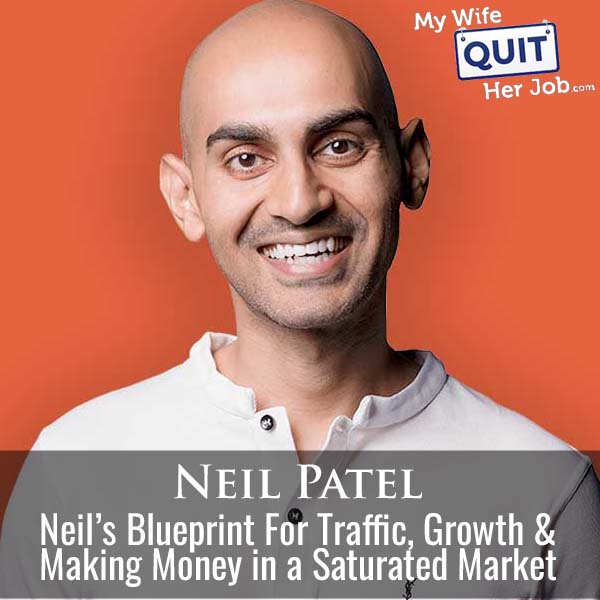601: Neil Patel’s Blueprint For Traffic, Growth & Making Money in a Saturated Market

```html Neil Patel's Blueprint for E-commerce Growth in the Age of AI: A Deep Dive
In an increasingly saturated digital marketplace, standing out and driving consistent traffic is paramount for e-commerce businesses. Steve Chou, host of the My Wife Quit Her Job podcast, recently interviewed digital marketing expert Neil Patel to uncover actionable strategies for achieving sustainable growth in the current landscape. Patel, founder of a leading marketing agency, shared insights gleaned from working with thousands of e-commerce brands, focusing on practical, proven methods that are effective today.
Navigating the Evolving Search Landscape
Patel emphasizes the significant shift occurring in search, moving from traditional methods to AI-powered solutions. He notes that while interfaces like ChatGPT are ideal for in-depth research, traditional search engines remain efficient for quick information retrieval, such as checking the weather. He predicts a future where search engines intelligently adapt their interface based on the user's query, seamlessly integrating AI capabilities when appropriate.
"The homepage of Google is really clean. It's just a search bar. They are smart enough to detect what your intent is and then show you the interface that maps up with that," Patel explained during the podcast. "And I think that's what we're going to see in search."
The Evolution of Content Creation
Content creation, according to Patel, has undergone a significant transformation. He outlines three distinct phases:
Early Days: Writing for robots, focusing on keyword stuffing to improve search engine rankings. The Shift to Human-Centric Content: Creating high-quality, user-friendly content that prioritizes the user experience. The Modern Approach: Crafting content for humans while simultaneously optimizing it for AI consumption.
This third phase requires e-commerce businesses to anticipate the questions consumers are asking and create comprehensive, informative content that AI can readily extract and utilize. For example, a dog food retailer could create articles answering specific questions about feeding puppies, different breeds, or senior dogs. When a user asks an AI assistant for recommendations, the AI can then draw upon this content, potentially recommending the retailer's brand.
Standing Out in a Crowded Market
Patel addressed the challenges of generating consistent traffic and sales in a saturated market. He stressed the importance of understanding customer intent and tailoring content accordingly. This involves identifying the specific questions potential customers are asking and providing detailed, informative answers that address their needs.
Leveraging AI for Market Research
E-commerce businesses can leverage AI tools to identify trending questions and topics related to their products. This data-driven approach allows them to create targeted content that resonates with their audience and positions them as authoritative sources of information.
The Agency vs. SaaS Debate: A Strategic Perspective
During the interview, Chou inquired about Patel's decision to focus on the agency route with NP Digital, given the perceived scalability of SaaS (Software as a Service) businesses. Patel explained that while SaaS offers lucrative valuation potential, the service-based sector often generates significantly more revenue. He also highlighted the intense competition within the SaaS landscape, where companies may aggressively spend to acquire customers, even at a loss.
Patel's strategy with NP Digital involves combining the agency model with software tools like Ubersuggest and AnswerThePublic. This hybrid approach allows the company to automate aspects of its services, enhance customer experiences, and improve overall competitiveness. He emphasized that the goal isn't solely to increase margins but to reinvest in providing greater value to customers, ultimately fostering loyalty and long-term growth.
Expert Analysis: The Future of E-commerce Marketing
Dr. Anya Sharma, a marketing professor at the University of California, Berkeley, commented on Patel's insights. "Neil Patel's emphasis on AI-optimized content is crucial for e-commerce businesses in today's digital environment," she stated. "Companies need to move beyond traditional SEO tactics and focus on creating content that is both informative for humans and easily digestible for AI algorithms. This requires a deep understanding of customer intent and the ability to anticipate the questions they are likely to ask."
Furthermore, Dr. Sharma highlighted the importance of Patel's hybrid agency-software model. "By integrating proprietary tools into their service offerings, agencies can deliver more efficient and effective solutions, ultimately providing greater value to their clients."
The Historical Context of Digital Marketing
Patel's career trajectory mirrors the evolution of digital marketing itself. Starting with early SEO tactics focused on keyword stuffing, he has witnessed and adapted to the ever-changing landscape of search engine algorithms and user behavior. His current emphasis on AI-optimized content represents the latest iteration in this ongoing evolution, requiring e-commerce businesses to stay informed and adapt their strategies accordingly.
Another industry analyst, Mark Thompson, CEO of digital marketing firm "Evolve Media," adds, "Patel's insights are particularly relevant given the increasing reliance on AI-powered search and the growing importance of content marketing. E-commerce businesses that fail to adapt to these trends risk falling behind their competitors."
Conclusion
Neil Patel's interview on the My Wife Quit Her Job podcast offers valuable insights for e-commerce businesses seeking to thrive in the age of AI. By understanding the evolving search landscape, creating AI-optimized content, and embracing innovative business models, companies can position themselves for sustainable growth and success in an increasingly competitive market. ```
Originally sourced from: WifeQuitHer Job
